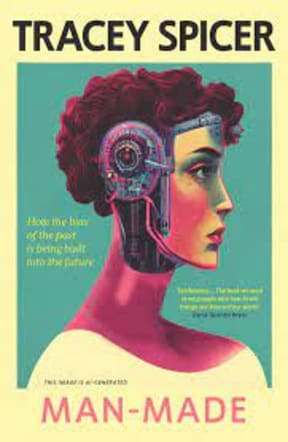It's no accident that Siri and Alexa are designed to sound female while corporate chatbots have male voices, says award-winning Australian journalist Tracey Spicer.
She speaks out against the use of sexist and racist stereotypes by artificial intelligence technology in the new book Man-Made.

Australian journalist Tracey Spicer Photo: Supplied
Spicer is glad that in New Zealand, people are hotly debating AI ethics after the National Party's unapologetic use of AI to generate images for campaign material was revealed.
As she sees it, there are two big problems with political parties using artificial intelligence in this way – job loss for local actors and breach of copyright.
"When AI creates those images, it scrapes data and content from all over the world from images created by other people who should be given payment for the work they've created.
"It's unfortunate for the National Party, which created the ad, but it's a conversation we all need to have about who owns the images, who's benefitting and who's missing out.'
In the first draft of Man-Made, before developing a dynamic disability due to Long Covid, Spicer wrote "proudly" about her disdain for smart home technology.
Now she'd be grateful for anything that could save her from taking an extra few steps to the light switch.
"Long Covid is partially an energy dysfunction disorder. So every time you stand up, everything you try to do anything cognitively, emotionally or physically, you deplete your energy at an exponential rate."

The cover of Man-Made by Tracey Spicer Photo: Simon & Schuster
We need more people with disabilities involved in designing smart-home technology and technology in general, Spicer says.
"Inclusive design is the key for us to live with AI technology and for it to benefit all of humanity, not the chosen few."
In medical technology the potential of AI assistance is promising, she says, yet in many public hospitals, it props up ageism via algorithmic bias.
"I'm 55 years of age. If I go to a hospital that's leaning on an algorithm built using what's called 'Frankenstein' data sets, which is data cobbled together from all different sources and not representing the proper spread of the population, I'm likely to be refused a ventilator. It will be given to someone who is 30 because they're viewed as being more productive to society rather than an older person who's over 50."
Challenging stereotypes like this can begin with casual conversations and small actions, Spicer says.
Banish concerns your voice assistant's identity is based on a "1950s idea about women and girls being servile" and switch it over to male. Chat to people you know about the hazards of using the advanced chatbop ChatGPT, which brings up non-cited sources and creates fake news.
Many of the world's current law-markers don't seem to grasp these kinds of hazards, Spicer says, and we urgently need more politicians who are tech-savvy.
"Governments need to work out the drawbacks, then regulate and legislate AI for the sake of humanity."
The world's first set of rules on artificial intelligence (The Artificial Intelligence Act) goes before the European Parliament in mid-June 2023.

